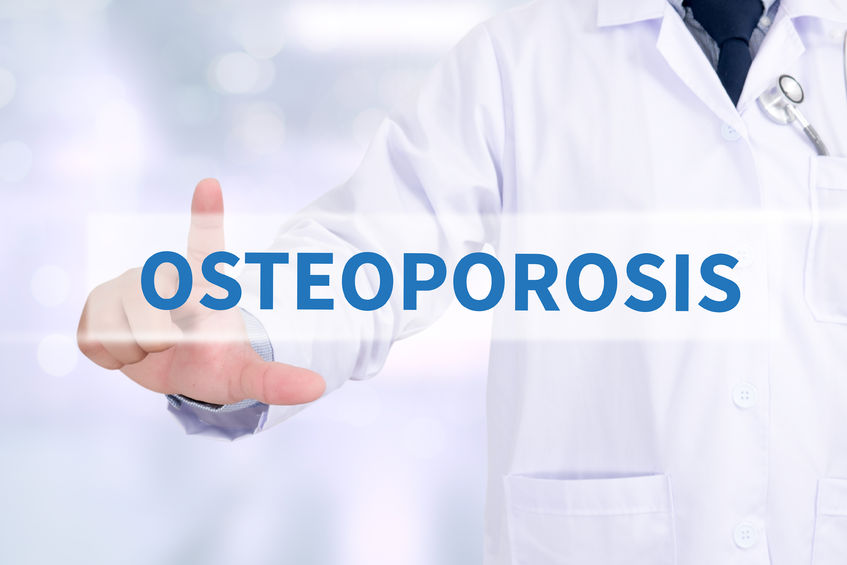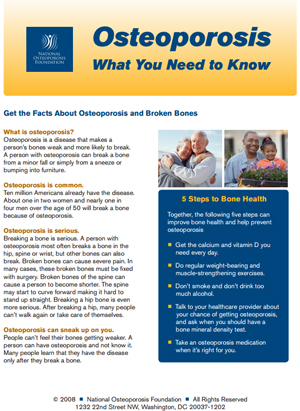Osteoporosis is a bone disease that causes your bones to become weakened and fragile, and sometimes break. In fact, osteoporosis actually means “porous bones.” Everyone’s bones have tiny, microscopic holes and spaces; but, bones with osteoporosis have larger holes and spaces, making bones less dense, more fragile, and more prone to breaks.
Is osteoporosis common?
Chances are, someone you know has osteoporosis. According to the National Osteoporosis Foundation, “about 54 million Americans have osteoporosis.” [1] They also estimate that about 50% of women, and 25% of men older than age 50 “will break a bone due to osteoporosis.”
How do I get osteoporosis?
Osteoporosis isn’t something you catch from someone else. It’s a disease that has many risk factors, some of which you can’t control, but some that you can. The American Academy of Rheumatology points out some of these risk factors. [2]
For example, some risk factors you can’t control include:
- Age (as people get older, their bone density decreases)
- Ethnicity (non-Hispanic Whites and Asians are at a greater risk)
- Bone structure (a small bone structure puts you at a greater risk)
- Previous fractures (especially after you’re 50)
Some of the risk factors you may control include:
- Smoking cigarettes
- Excessive alcohol consumption
- Low calcium and vitamin D levels
- Sedentary lifestyle
- Eating disorders (e.g., anorexia nervosa, bulimia)
- Low levels of estrogen in women (e.g., often caused by menopause)
How does my doctor diagnose osteoporosis?
Your doctor here at Horizon Family Medical Group can help you determine your osteoporosis risk by performing a bone density scan, or bone mineral density (BMD) test. Depending on your results, your doctor may opt for more testing if your test scores show mild bone loss (osteopenia) or osteoporosis.
How should I treat my osteoporosis?
Everyone is different, so treatment options may vary. However, our doctors may check whether you’re getting enough calcium in your diet. If not, you may need to start taking calcium supplements. Our doctors will discuss with you what the right dose will be for situation.
Your doctor may also recommend you increase your vitamin D levels (supplement) to help your body absorb the calcium. Supplements, combined with moderate exercise (such as walking), will ensure your body is getting the exercise it needs. [3]
Depending on your situation, your doctor may also prescribe certain medications to treat or help prevent further bone loss. Talk to your physician here at Horizon Family Medical Group about options to help ensure you’re doing all you can to stay healthy and prevent or delay osteoporosis as long as possible.
Resources
- National Osteoporosis Foundation: https://www.nof.org/patients/what-is-osteoporosis/
- American Academy of Rheumatology: http://www.rheumatology.org/I-Am-A/Patient-Caregiver/Diseases-Conditions/Osteoporosis
- NIH Senior Health: https://nihseniorhealth.gov/osteoporosis/whatisosteoporosis/01.html
- https://cdn.nof.org/wp-content/uploads/2016/02/Osteoporosis-What-you-need-to-know.pdf


